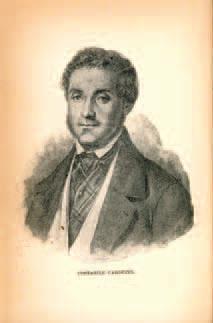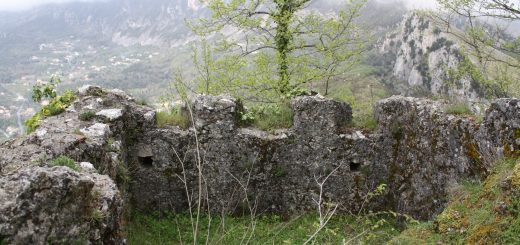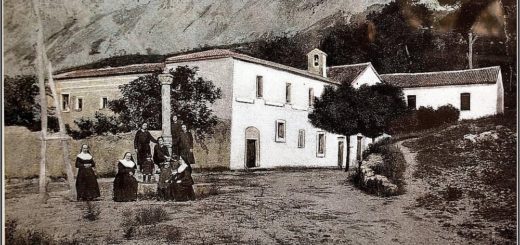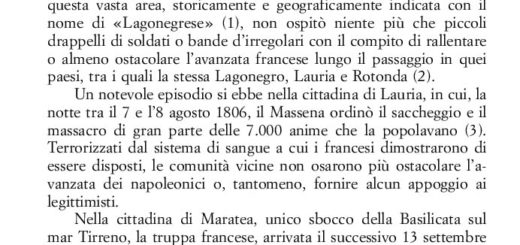L’assassinio di Costabile Carducci ad Acquafredda visto dall’Inghilterra

Oggi ricorre il 167esimo anniversario della morte di Costabile Carducci, deputato al parlamento del Regno delle Due Sicilie durante i torbidi del 1848 assassinato dai fanatici reazionari capeggiati da Vincenzo Peluso, ambigua figura che nascose diversi crimini sotto le pieghe della talare.
Costabile Carducci
Di Carducci molto si è scritto (e neanche sempre a proposito).
Non sempre la storiografia italiana ricorda che l’assassinio di Costabile Carducci ad Acquafredda (frazione di Maratea) ebbe un’eco in tutta Europa. Lo scandalo di un parlamentare ucciso da quello che a tutti gli effetti era un sicario del suo sovrano fece rumore a livello internazionale. Qui di seguito, riporto la narrazione che di questo evento fece l’inglese lord William E. Gladstone (1809-1898), autore delle celebri Two Letters to the Earl of Aberdeen, in cui denunciava il governo borbonico a Napoli.
Il racconto di Gladstone
«Carducci was in 1848 named a Deputy for his own province, that of Salerno, and a Colonel of the National Guard. He was treated by the Sovereign with every sign of confidence and kindness. Alarmed for his personal safety after the 15th of May, he took refuge on board a vessel of the French squadron. He afterwards took a passage with nine companions from Malta to Calabria, intending to make his way to Naples, and exert himself for the maintenance of the Constitution. They were wholly unarmed. They were compelled by bad weather to land at Acqua Fredda, in Basilicata, and near the province of Salerno. That any reward had been set upon the head of Carducci, or any proclamation issued against him, is totally untrue. Peluso, the priest, living near, received and entertained him. The party were waiting for the settlement of the weather to re-embark, when they saw their host approaching with a body of armed men. Three of them were wounded by a discharge of musketry, of whom Carducci was one; and the effects of the party were rifled, while the wounded were made prisoners. Carducci was carried off by Peluso, and his body was found some days afterwards lying unburied with the head cut off. […]
The magistracy, which had not then been corrupted by intimidation as at present, bestirred itself. Pinto, Judge of the Circondario, began the istruzione, or process. He was dismissed; and Gaetano Cammarota was sent in his stead to manage the affair. He proceeded in it with fidelity; and he, too, was recalled. But a third Judge, De Clemente, had been joined with him by the Procurator-General, on account of the importance of the cause. He likewise valiantly persevered in the investigation; and the Procurator-General, Scura, honourably and manfully sustained him. The Procurator-General was dismissed, and is now in exile. De Clemente, appearance only more fortunate, was promoted to be giudice regio at Potenza; but was after one month deprived.»
Lord Gladstone chiude la narrazione con una eloquente chiosa: «And here I close the history of the murdered Deputy Carducci and the Priest Peluso his murderer: and with it my reference to the daring but futile efforts of the writers I have named to procure belief for fictions which a sense of prudence and decency, or a regard for truth, or both combined, have kept the Neapolitan Government itself from attempting to palm upon the world.»
Traduzione
«Carducci era stato eletto deputato nel 1848 per la sua provincia, quella di Salerno, nonché colonello della guardia nazionale. Era stato trattato da sovrano con ogni sorta di confidenza e gentilezza. Allarmato per la sua incolumità dopo la giornata del 15 maggio, scappò su un vascello dello squadrone francese. Successivamente, si rifugiò con nove compagni tra Malta e la Calabria, con l’intenzione di tornare a Napoli e adoperarsi per la salvezza della Costituzione. Era disarmati. Fermati dal maltempo, dovettero approdare ad Acquafredda in Basilicata, presso la provincia di Salerno. Non è vero che nessuna taglia o mandato fosse stato emanato su di loro. Peluso, il prete, vivendo vicino, lo ricevette e lo accolse. La comitiva attendeva il miglioramento del tempo per ripartire, ma poi l’anfitrione andò da loro con un corpo di armigeri. Tre di loro vennero feriti dalle fucilate, tra essi Carducci, gli averi della comitiva sequestrati e tutti furono fatti prigionieri. Carducci fu trascinato via da Peluso, il suo cadavere venne ritrovato giorni dopo, decapitato e lasciato a marcire. […]
La magistratura, quella parte ancora non corrotta, si animò. Pinto, giudice del circondario, iniziò l’istruzione, ossia il processo. Ma fu fermato e Gaetano Cammarota venne mandato al suo posto per prendere in mano le cose. Anche lui procedette rettamente e fu anch’egli sostituito. Il terzo giudice, De Clemente, venne però affiancato dal Procuratore Generale, a sottolineare l’importanza della causa. Anche lui procedette valentemente nell’indagine e il Procuratore Generale, Scura, lo sostenne onorevolmente. Alle fine, il Procuratore Generale venne fatto dimettere e ora è in esilio. De Clemente, apparentemente più fortunato, è stato promosso giudice regio di Potenza, ma è stato poi licenziato dopo un mese.»







